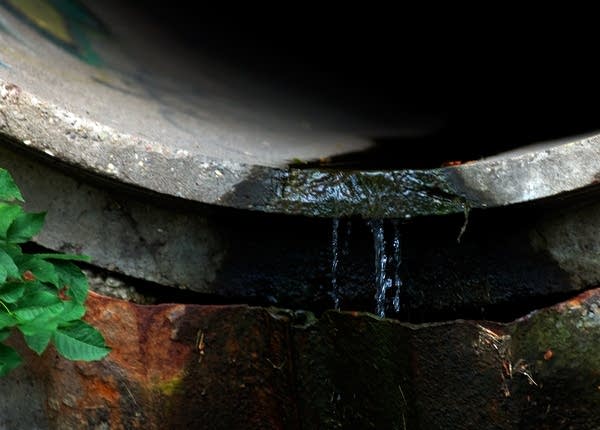River otter's return a sign of healthier Mississippi
Go Deeper.
Create an account or log in to save stories.
Like this?
Thanks for liking this story! We have added it to a list of your favorite stories.

Trapping and pollution almost drove the river otter out of Minnesota.
But now, the otter is back, and there's even a report of river otter living in a once badly polluted stretch of the Mississippi river in downtown Minneapolis.
Forty-five years ago, Minnesota Department of Natural Resources fish biologist Jack Skrypek was on the Mississippi as it flows through the Twin Cities test netting for fish.
Skrypek, now retired, remembers tugging at the net, thinking it was snagged on the river bottom, then saw a stinking mass slowly rise to the surface.
Turn Up Your Support
MPR News helps you turn down the noise and build shared understanding. Turn up your support for this public resource and keep trusted journalism accessible to all.

"My net was solid toilet paper," he said. "We had a terrible time, we had to try clean that net. I would have liked to taken it to the shore and burned it."
And that wasn't Skrypek's worst catch.
On another test netting trip Skrypek recalls an even smellier incident.
This time Skrypek and his helper brought up a net covered with black, gooey tar.
"Me and my assistant and our boat was entirely black and then also there was sewage sludge on top of it," he said.
Now, on the Mississippi River in downtown Minneapolis, Bob Schmitz, a businessman, avid outdoorsman, enthusiastic river rower and paddler, leads a group on an early morning journey in search of river otter.
"Right in here is where I saw the river otter," he said.

Several times this summer Schmitz has spotted river otters cavorting on the shore of the Mississippi as it glides past upscale condos, under bridges and train trestles in downtown Minneapolis on the eastern edge of Nicollet Island.
Carrol Henderson is Minnesota's man of letters when it comes to the state's fur bearing and feathered residents. He said a river otter sighting is remarkable and "well within the realm of possibility."
Years ago, Henderson, now the Minnesota Department of Natural Resources non-game wildlife supervisor, helped re-introduce otters in western Minnesota.

Henderson says an otter sighting on the Mississippi in Minneapolis would mean the once befouled river is good enough to satisfy the critter's rather finicky standards for clean water.
And the river is certainly cleaner.
There are no longer mats of raw sewage and masses of toilet paper that Jack Skrypek encountered in 1964, but the river is far from pristine.
A good share of the Mississippi through Minneapolis and St. Paul is listed by the Minnesota Pollution Control Agency as an impaired water.
The MPCA's Barb Peichel supervises monitoring of the river's water quality in the metro area.

Peichel said the river still carries bacteria that can cause illness, but she doesn't rule out swimming in it.
Diverting and treating what we flush down our toilets has done a lot to reduce the pollution.
A new concern, Peichel said, is the presence of so-called endocrine disruptors, classes of chemicals in very small amounts whose sources aren't entirely clear.
"It's gotten better in some aspects, but some of these other chemicals and contaminants are complex," Peichel said.
There are literally dozens of entities and volumes of regulations aimed at advancing clean up of the Mississippi.

Skrypek is as worried as anyone about the environmental havoc humans are causing, but he cites the return of the river otter to the Mississippi and the cleaner water as a signpost on the roadway to environmental redemption.
"Look at today, it's a much improved resource and it's taken a lot of hard work by a lot of people and dedication to get it done," he said.
There's still plenty of evidence of harmful human impact as storm water flushes cigarette butts, trash and an occasional whiff of a mysterious solvent into the river.
Although Schmitz doesn't spot a river otter on this trip, the sighting of a great blue heron, anglers reeling in fat fish and beaver ferrying fresh boughs to their lodge offer a glimpse of the Mississippi's bounty as it flows through the state's two largest cities.





